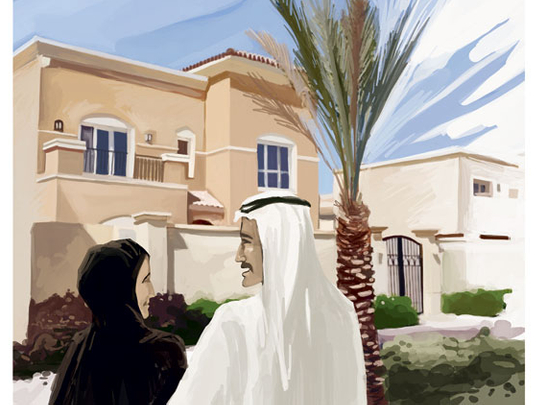
One of the most important aspects of leadership in a country is the keenness with which leaders and decision-makers deal with citizens' central social concerns.
Such has been the case with housing in the UAE, which only 40 years ago suffered from sub-standard housing in its urban areas and comprised largely Bedouin domiciles in the desert that lacked basic amenities and hygiene. Tents and desert life were not alien to the population, but what existed did not satisfy the conditions for a healthy and secure existence that are essential requirements for a modern state.
Indeed, housing in the UAE occupies a central position in the country's social and economic policies and in the leaders' understanding of their social mission. This is because shelter, just like food and clothing, is considered a basic human right sanctified by local and international covenants. In addition, planning a rational housing policy helps in cementing good social relations within and between communities and in raising expectations and standards of living. Ultimately, a good housing policy assures political stability and a secure social order.
Housing policy in the UAE has three different forms. The first is that of providing assistance in the form of loans or grants to nationals who own land and wish to build a private home.
Building homes
The second is that of offering interest-free long-term loans for nationals who can repay them. The third is providing free housing for limited-income nationals. Housing is also a two-tiered affair, with policy-making and funding at both the federal and local levels. While this double status may affect planning and goals, it helps leaders to address both general and emirate-specific concerns.
While the Ministry of Public Works is the federal authority tasked with overseeing housing issues in the country, it is the Shaikh Zayed Housing Programme that is the premier organisation helping to fund loan programmes and building shelters for nationals from all emirates. Since its establishment, the programme has funded low-income nationals making less than Dh10,000 per month with outright grants. It has also provided interest-free loans of Dh500,000 for others. As of April 2011, the programme has provided 23,000 housing-related financial offerings that have been used to finish the building of 11,000 homes, while 12,000 others are in the process of being completed.
Just this week, the programme approved 1,505 payments — for nationals from Abu Dhabi, Dubai, Sharjah, Ajman, Umm Al Quwain, and Ras Al Khaimah — 996 of which were loans and 509 were outright grants.
There are also many emirate-specific organisations dedicated to helping nationals obtain housing in the different emirates. The Abu Dhabi Private Loans Authority provides interest-free assistance to those wishing to build a home. Between its establishment in 1991 and 2009, the authority granted over Dh23 billion to nationals living in Abu Dhabi in different loan amounts. In 2008, President His Highness Shaikh Khalifa Bin Zayed Al Nahyan, as ruler of Abu Dhabi, increased loan amounts from Dh1.2 million to Dh2 million.
The Mohammad Bin Rashid Housing Establishment handles housing issues in Dubai, where it has provided 1,646 homes since it was founded in 2006. In 2010 alone, the programme's budget was close to one billion dirhams. There is also the Shaikh Saud Housing Programme in Ras Al Khaimah that was established in 2008 and has approved over 50 petitions for financial assistance to the needy.
All of these programmes have been established as social enterprises dedicated to the service of Emirati nationals. They also indicate a special relationship between leaders and decision-makers and the populace at large. Without them, the promise of a modern and prosperous state would have had to be deferred to private endeavour.
Layla Al Kitbi is an Emirati writer.










